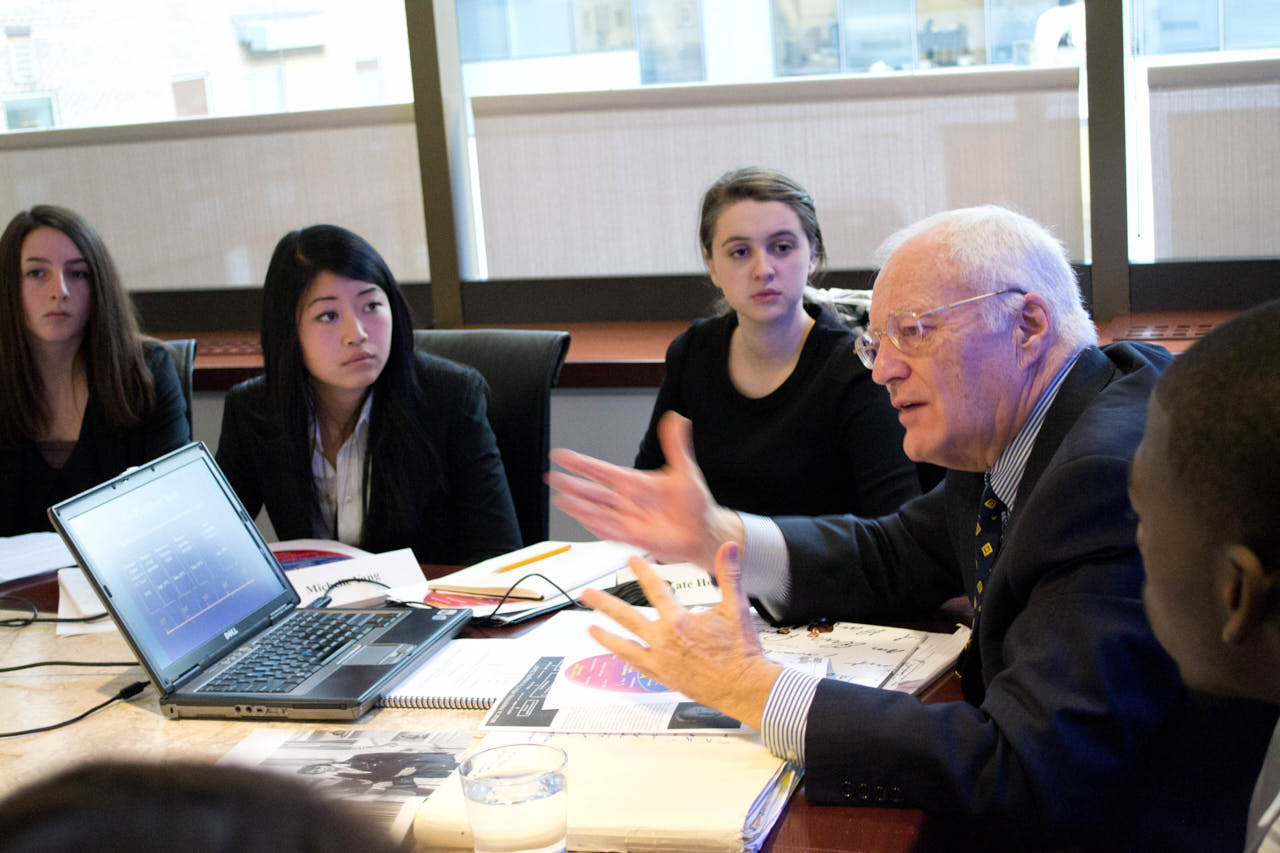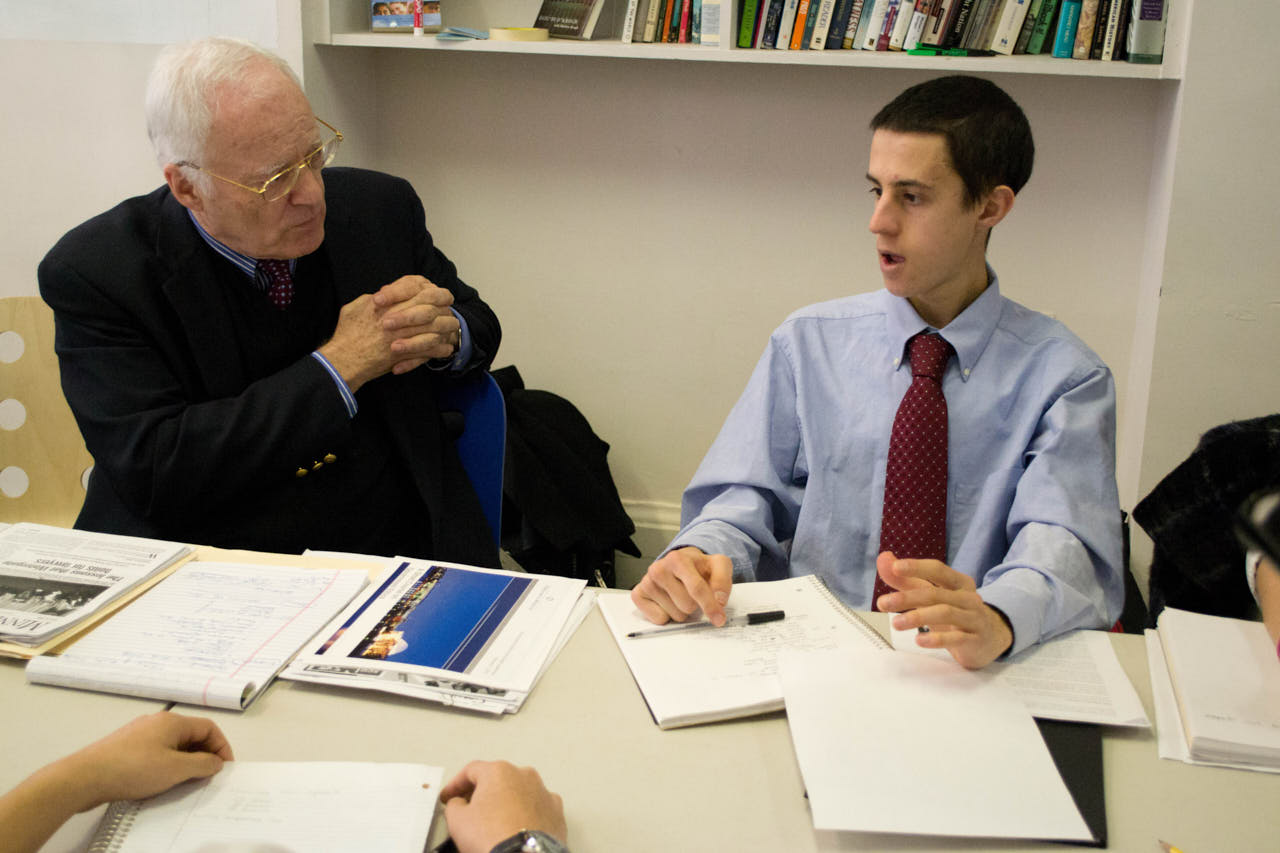Ethical Thinking Master Class with Egil ‘Bud’ Krogh, Deputy Assistant to Richard Nixon
One of the best parts of our flagship Ethics and Leadership class is the “Master Class.” Each cohort of SEGL students meets with dozens of guests over the course of the semester, gaining critical insights and skills from each one. When our guests go beyond Q & A, something particularly special happens. Our first Master Class of the semester occurred Friday after a week of learning about ethical theories, past and present.
As we wrote last time, on Monday the students simulated the “state of nature” and heard about Aristotle, Immanuel Kant, and John Stuart Mill. On Wednesday morning, we paid a visit to the Center for the Study of the Presidency and Congress to meet Egil ‘Bud’ Krogh, who served as Deputy Assistant to Richard Nixon and co-directed the infamous “Plumbers” of the Watergate Era.

Bud, as he asked the students to call him, demonstrated why he won our inaugural “Golden Mug” by recounting several compelling and colorful stories from his time in the White House. (The Golden Mug, named for the coffee mugs that each SEGL speaker receives as a thank you, honors the speaker our graduates deem the most important to their development as leaders.)
He began by describing the day Elvis Presley visited the White House. Bud thought it was a practical joke until the King walked into his office begging for a meeting with the President. Delighted, Bud arranged an impromptu meeting that would produce the most-requested photograph in the history of the National Archives: Nixon and Elvis in the Oval Office. After discussing brainwashing and the Beatles, Elvis made his ask: could he serve as a Special Agent at Large for the Bureau of Narcotics and Dangerous Drugs, and receive a badge to go with it? Nixon turned to Bud and asked, “Can we get him a badge, Bud?”
Before giving his answer, Bud turned to our students, reminded them that he had no idea whether this was possible, and asked what he should have said. Here he was in front of his boss–the leader of the free world–and his idol–the King of Rock and Roll. He had arranged this meeting. And he wanted to please both of them. After a brief discussion, Bud revealed his answer: “Yes sir, Mr. President, if you want him to have a badge, we can get him one.” The only problem? It wasn’t legal. The FBI was furious, but Elvis got his badge. (You can read a longer description of this episode, minus the ethical dilemma, here.)
What is the moral of this story? Bud connected his desire to please and his inability to push back against “groupthink” to a decision he made later as Director of the Plumbers. That decision–to authorize the break-in at Dr. Lewis Fielding’s office in order to discredit Daniel Ellsburg, who had recently released the Pentagon Papers–ultimately helped cause the downfall of the Nixon Administration.
What would have happened if Bud had told Nixon and Elvis, “I’ll get right on it” instead of “Yes”? What would have happened if he had paused to ask whether the Fielding break-in violated an American citizen’s Constitutional rights?

These questions led Bud to create “The Integrity Zone,” a practical ethical decision making tool that he shared with students. What are the internal threats to integrity? What are the external threats? Understanding them can help inform your answer to the three questions Bud considers most important for leaders: “Is it whole and complete?” “Is it right?” and “Is it good?”
Later on Wednesday we traveled to O’Melveny and Myers, one of the oldest law firms in the country, to meet with Bob Rizzi. Rizzi, a partner at O’Melveny, vets and provides ethical training to Cabinet members and other senior Executive Branch appointees. He gave the class a lecture on government ethics that he normally gives to Georgetown and Harvard law students.

(He also teaches them about Bud and Watergate, so it was particularly appropriate that Bud came along to meet Rizzi.) How do you ensure a Cabinet appointee is ethical? How do we avoid the next Jack Abramoff scandal? Rizzi’s overview provoked many questions and helped students see inside the process.
On Friday, Bud returned to SEGL for his Master Class. Each of the students read a provocative real-life case study about the 1972 takeover of the Bureau of Indian Affairs. The case did not include the outcome or the final decisions that Bud made to try and diffuse the crisis. For two hours the students wrestled with the different facets of a complex ethical dilemma that required a quick judgement. Should we storm the building, even though lives will be lost, because the American Indians are trespassing and we have legal authority to evict them? Or should we attempt to negotiate with a rag-tag group of protesters and risk a prolonged standoff and a dangerous precedent? We will let the students share their positions with you, along with Bud’s captivating end to the story.
Friday was a particularly memorable food day, too: Chelsea (who is assuming food coordinator duties this semester) earned a prolonged cheer for her maple-glazed carrots and pesto pasta with chicken and avocado at lunch, as well as her Indian chickpea korma with ginger cabbage at dinner. Add to that a cookie dough ice cream cake honoring our first birthday of the semester and we had some very happy students!
Friday evening we also began our Rwanda case study–more on that next week.









